#cognitiveautomation
Explore tagged Tumblr posts
Text
How can intelligent automation enhance the efficiency and productivity of BPO operations with process orchestration?
Intelligent automation, when combined with process orchestration, can significantly enhance the efficiency and productivity of BPO (Business Process Outsourcing) operations in several ways:

Streamlined Workflows: Process orchestration allows BPOs to design and implement streamlined workflows that automate repetitive tasks and eliminate manual handoffs. This minimizes delays, reduces errors, and speeds up overall process execution.
Faster Turnaround Times: With intelligent automation, tasks that previously required manual intervention can be completed much faster. BPOs can handle larger volumes of work and meet tighter deadlines, improving overall service delivery.
Reduced Error Rates: By automating routine and rule-based tasks, intelligent automation reduces the chances of human errors, leading to increased accuracy and higher-quality outputs.
Optimized Resource Allocation: Process orchestration helps BPOs allocate resources more efficiently by dynamically routing tasks to the most appropriate teams or bots based on their expertise and availability.
Enhanced Customer Experience: Faster and error-free processes lead to improved customer experience as BPOs can respond quickly to customer inquiries, provide timely resolutions, and maintain consistent service levels.
Scalability: Intelligent automation allows BPOs to scale their operations seamlessly to handle varying workloads without the need for extensive manual intervention or hiring additional staff.
Data-Driven Insights: Process orchestration integrated with analytics provides BPOs with valuable insights into process performance and bottlenecks. This data-driven approach enables continuous improvement and optimization of workflows.
Adherence to Compliance and Regulations: By using intelligent automation, BPOs can ensure consistent adherence to compliance and regulatory requirements, reducing the risk of non-compliance errors.
Employee Empowerment: Automation frees employees from repetitive tasks, allowing them to focus on more strategic and value-added activities. This boosts employee satisfaction and job fulfillment.
Cost Savings: With improved efficiency and reduced errors, BPOs can save costs associated with labor, rework, and customer complaints. Optimized resource utilization also contributes to cost-effectiveness.
Integration of Legacy Systems: Process orchestration facilitates the integration of legacy systems with modern automation technologies, enabling BPOs to leverage existing investments while benefiting from automation.

Overall, the combination of intelligent automation and process orchestration empowers BPOs to transform their operations, achieve higher productivity, deliver better customer experiences, and remain competitive in a rapidly evolving business landscape.
#IntelligentAutomation#RoboticProcessAutomation#AIautomation#MachineLearning#DigitalTransformation#IntelligentBots#AutomateWithAI#SmartAutomation#CognitiveAutomation#AIandRPA#AutomationTechnology#AIinBusiness#AutomatingTheFuture#AutomationRevolution#IntelligentProcesses#DataDrivenAutomation#AutomatedWorkflows#AIintheWorkplace#SmartBots#AutomateEverything
0 notes
Photo

check out my worldrpa conference session: https://youtu.be/5B5W-pth1sY presentation link: http://bit.ly/2kIGUmn #rpa #cognitiveautomation #artificialintelligence #worldrpa #1point21gws
1 note
·
View note
Photo

A perfect marriage -The Fusion of 5G, IoT, and AI, The #future is here🤖 The amount of data is increasing rapidly. More and more devices can produce and transmit data. We live in a world that threatens to drown in the flood of data. The merger of 5G, IoT, and AI could help us and be of great importance when it comes to profiting from the rapid increase in available data. #AI #5G #IOT #industry40 @ipfconline1 @mvollmer1 @evankirstel @fabrizinho11 #edgecomputing #IntelligentConnectivity #CognitiveAutomation #Blockchain #Automation #industry40 #Serverless #BigData #MachineLearning #mwc2020 VIA @UniverCurious #AI #ComputerVision #MachineLearning #AR #VR #Innovation #EmergingTech #Tech #Technology @MargaretSiegien @enricomolinari @MikeQuindazzi @WeFutureAI https://www.instagram.com/p/B8Ze3TTgHIP/?igshid=rvkbb2ea4c5z
#future#ai#5g#iot#industry40#edgecomputing#intelligentconnectivity#cognitiveautomation#blockchain#automation#serverless#bigdata#machinelearning#mwc2020#computervision#ar#vr#innovation#emergingtech#tech#technology
0 notes
Photo

The last edition of GIC concerns #tech trends that will transform #Global #In #House #Centers. Read More: https://www.ncnonline.net/news-in-brief/cognitive-automation-ai-ml-nlp-blockchain-big-data-to-transform-gic-landscape-in-2022/
0 notes
Photo

Responsive customer service. Increased audience engagement. Improved branding. Faster lead generation. And intelligent analytics. An interactive chatbot brings a lot to your business. Read on to discover the full range of benefits that make it an optimal tool for optimization. https://lnkd.in/giJB_Du
0 notes
Photo
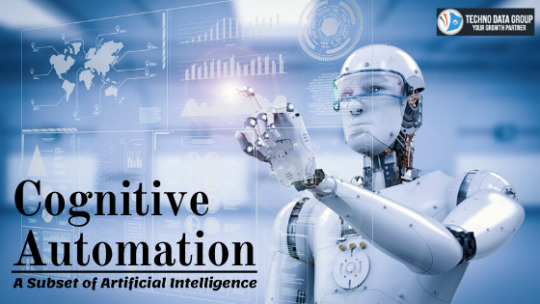
#CognitiveAutomation (RPA) is a fast-evolving field of computing and is an emerging form of #BusinessProcessAutomation (BPA) #Technology. It involves the #Automation of many internal and external #Customer journeys through software “bots” - #TechnoDataGroup
0 notes
Photo
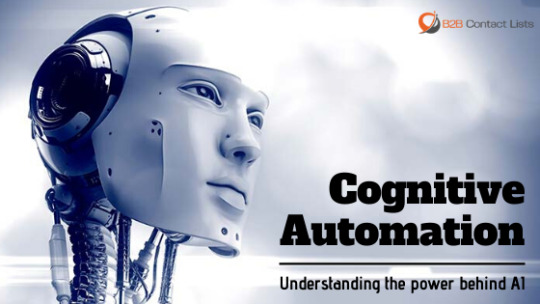
Understand the power of Artificial Intelligence(AI) with Cognitive Automation Cognitive Automation is pre-trained to automate specific business processes and needs less data before making an impact. hashtag#B2bContactLists hashtag#CognitiveAutomation hashtag#AI hashtag#ArtificialIntelligence hashtag#RAP
0 notes
Photo
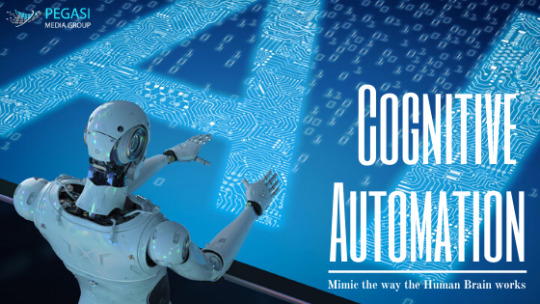
Cognitive Automation is based on software bringing intelligence to information-intensive processes. It is commonly associated with Robotic Process Automation (RPA) as the conjunction between Artificial Intelligence (AI) and Cognitive Computing. Understand the power behind AI and Cognitive Automation that helps you critically achieve digital transformation. #AI #CognitiveAutomation #RoboticProcessAutomation #DigitalTransformation #PegasiMediaGroup
0 notes
Photo

#Personalization is one of the strongest reasons for businesses to tread the #AI path with intelligent product development. According to a report by PwC 63% of business executives believe AI can offer a superior one-to-one personalized experience. #day1tech #artificialintelligenceai #machinelearningalgorithms #machinedata #deeplearning #cognitiveautomation 11 Website: https://www.day1tech.com/
0 notes
Link

#CognitiveRoboticProcessAutomation#RoboticProcessAutomationTrends#RoboticProcessAutomationCompanies#CognitiveAutomation#rpa services
0 notes
Text
Unleashing the Power of Cognitive Process Automation
In today's fast-paced business environment, organizations are constantly seeking innovative ways to streamline their operations, reduce costs, and improve overall efficiency. One such solution that has gained significant traction in recent years is Cognitive Process Automation (CPA). By harnessing the power of artificial intelligence (AI), machine learning (ML), and natural language processing (NLP), CPA is revolutionizing traditional process automation, enabling businesses to automate complex cognitive tasks that were previously thought to be impossible. In this blog post, we will explore the concept of cognitive process automation, its benefits, and its potential impact on businesses across various industries.
Understanding Cognitive Process Automation:
Cognitive Process Automation refers to the use of AI technologies to automate tasks that involve cognitive abilities, such as problem-solving, decision-making, natural language understanding, and learning. Unlike traditional process automation, which primarily focuses on automating repetitive, rule-based tasks, CPA enables organizations to automate more complex processes that require human-like cognitive skills.
Key Components of Cognitive Process Automation:
Artificial Intelligence (AI): AI technologies, such as machine learning and deep learning algorithms, form the foundation of CPA. These algorithms enable systems to learn from data, identify patterns, and make intelligent decisions.
Machine Learning (ML): ML algorithms allow systems to automatically improve their performance and decision-making abilities over time, without explicit programming. By analyzing large volumes of data, ML models can recognize complex patterns and make predictions or recommendations.
Natural Language Processing (NLP): NLP enables computers to understand, interpret, and generate human language. With NLP, CPA systems can comprehend and respond to natural language queries, extract relevant information from unstructured text, and even generate human-like written content.
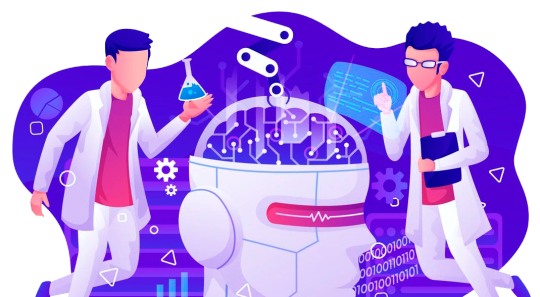
Benefits of Cognitive Process Automation:
Enhanced Efficiency: By automating cognitive tasks, CPA eliminates human error, reduces processing time, and enhances overall operational efficiency. This allows employees to focus on higher-value activities, such as innovation, creativity, and customer engagement.
Improved Decision-Making: CPA leverages advanced algorithms to analyze vast amounts of data and generate actionable insights. By automating decision-making processes, organizations can make more informed and data-driven decisions, leading to improved outcomes and competitive advantages.
Scalability and Flexibility: Unlike human workers, CPA systems can operate 24/7 without fatigue or downtime. This enables organizations to scale their operations rapidly, handle increased workloads, and adapt to changing business requirements with ease.
Cost Savings: By automating cognitive tasks, organizations can significantly reduce labor costs associated with repetitive, time-consuming processes. Additionally, CPA minimizes the risk of errors and rework, resulting in cost savings and improved resource utilization.
Enhanced Customer Experience: With the ability to analyze customer interactions and preferences, CPA systems can deliver personalized and tailored experiences. This leads to improved customer satisfaction, loyalty, and ultimately, increased revenue.
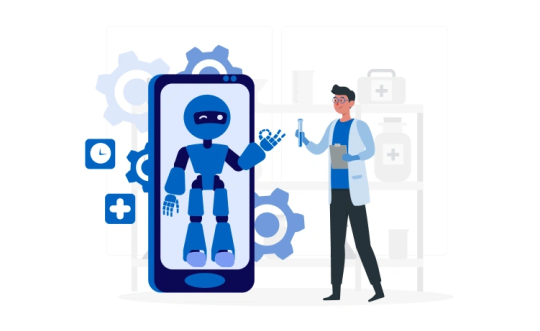
Potential Impact on Industries: Cognitive Process Automation has the potential to transform various industries, including:
Banking and Finance: CPA can automate complex financial analysis, fraud detection, risk assessment, and customer support, leading to improved accuracy, compliance, and customer service.
Healthcare: CPA can enhance medical diagnosis, optimize treatment plans, automate administrative tasks, and enable personalized patient care, improving healthcare outcomes and reducing costs.
Customer Service: By automating customer support processes, CPA can provide faster response times, personalized recommendations, and seamless interactions, resulting in enhanced customer satisfaction and retention.
Supply Chain Management: CPA can optimize inventory management, demand forecasting, logistics, and supplier relationship management, improving supply chain efficiency and reducing costs.
Cognitive Process Automation represents a significant leap forward in process automation, enabling organizations to automate cognitive tasks and leverage the power of AI, ML, and NLP. By embracing CPA, businesses can achieve enhanced efficiency, improved decision-making, cost savings, and deliver superior customer experiences. As technology continues to advance, organizations across various industries must embrace the opportunities presented by CPA to stay competitive in the digital age and unlock new levels of operational excellence.
Get in touch today to know more about Cognitive Process Automation
#CPA#CognitiveAutomation#IntelligentAutomation#AIpoweredAutomation#NLPbasedAutomation#RoboticProcessAutomation#MachineLearningAutomation#AutomatingWorkflows#CognitiveBots#AutomationRevolution#SmartProcessAutomation#DigitalTransformation#EfficiencyBoost#AutomateTasks#StreamlineOperations
0 notes
Photo

I will be speaking at World RPA, Cognitive & AI Summit 23rd Sep 2019 Hyderabad - Lemon Tree Premier, Hitech City
Speaking Topic: RPA & AI Vision: A real game-changer
https://rpaconferences.com/hyderabad/
Talk Abstract:
“Training AI systems is almost like an art form to get the best out of these systems. . . . There’s only a few hundred people in the world who can do that really well.”
-Demis Hassabis, the leader of Google’s DeepMind AI team
"Automation golden triangle” of robotic process automation (RPA), artificial intelligence (AI), and Cognitive Science is important for any enterprise to have a goal of a digital enterprise. The golden triangle helps in aligning and automating the processes for managing the enterprise business.
What’s Next ? An end-to-end business process automation with RPA and AI-powered decision-making and forecasting abilities.
“In a few years, machines will perform up to 10-25% of tasks related to bank operations, enhancing capacity and freeing staff to focus on value-driven tasks”
— McKinsey
#rpa #cognitiveautomation #artificialintelligence #worldrpa #1point21gws
1 note
·
View note